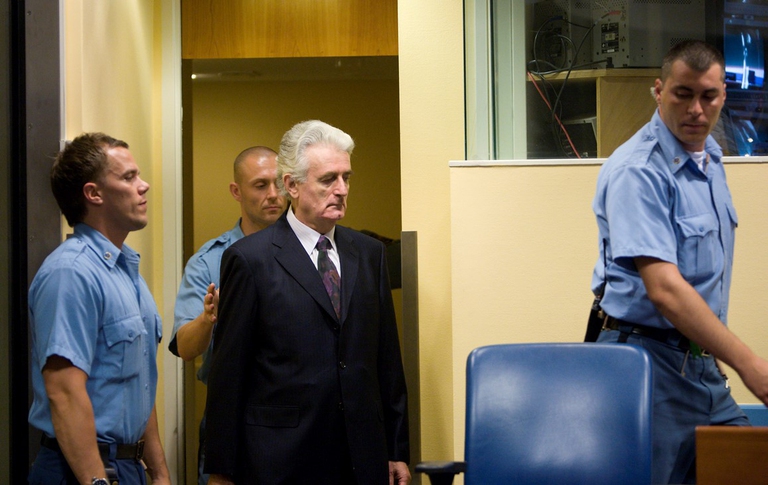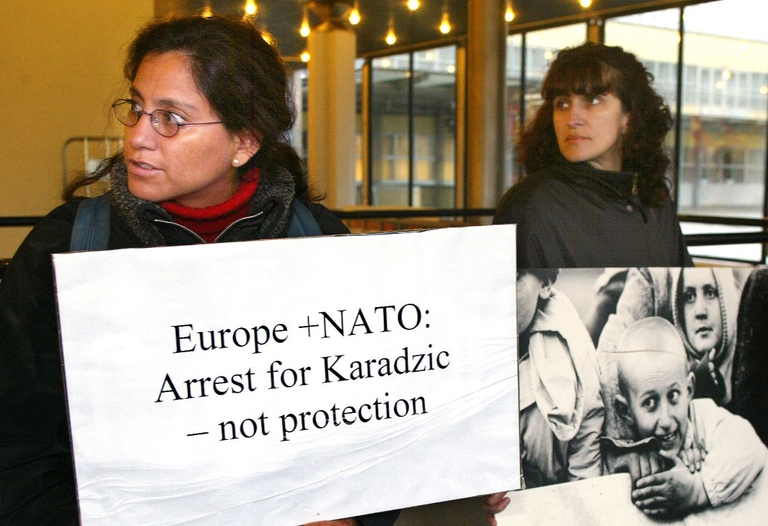
Costa Rica celebrated its first same-sex marriage when two women, Alexandra Quiros and Dunia Araya, celebrated their wedding: an “extraordinary moment”.
Dopo sei anni arriva il verdetto per Radovan Karadžić: colpevole di crimini contro l’umanità, del genocidio di Srebrenica e dell’assedio di Sarajevo. La richiesta dell’accusa era il carcere a vita.
Radovan Karadžić has been found guilty of crimes against humanity, the genocide in Srebrenica, and the Sarajevo siege. The former Bosnian Serb leader and commander-in-chief of Serb forces Karadžić has been sentenced to 40 years in jail by the United Nations International Criminal Tribunal for the Former Yugoslavia in The Hague, Netherlands.
When the trial started in 2009, the prosecution requested life imprisonment. Six years later, Karadžić was found guilty of 10 out of the 11 charges he faced for his role in the 1995 massacre of 8,000 Muslims in Srebrenica – the worst war crime in Europe since World War Two –, the siege of Sarajevo, persecutions (massacres, rapes, torture, raids, and ethnic cleansing operations) against non-Serbian citizens in 20 municipalities (including a concentration camp), and in holding soldiers of the United Nations Protection Force (UNPROFOR) hostage.
Before the end of the war, the International Criminal Tribunal for the Former Yugoslavia indicted Karadžić along with his military chief Ratko Mladic on 25 July 1995 for the crimes committed between 1992 and 1995. Karadžić evaded arrest and for over a year remained with his family in Pale – despite a 5-million-dollar reward for his capture – and remained fugitive as of 1996. He was arrested 12 years later, in 2008, in Belgrade, Serbia, where he lived under the identity of a practitioner of alternative medicine, allegedly helped by Serbian intelligence.
Karadžić declared his innocence and now has 30 days to appeal. Speaking after the verdicts, the tribunal’s chief prosecutor Serge Brammertz, said to The Guardian: “Moments like this should also remind us that in innumerable conflicts around the world today, millions of victims are now waiting for their own justice. This judgement shows that it is possible to deliver it”. The verdict has been attended by more than 500 people, 150 of which were representatives of associations for victims of war.
Siamo anche su WhatsApp. Segui il canale ufficiale LifeGate per restare aggiornata, aggiornato sulle ultime notizie e sulle nostre attività.
![]()
Quest'opera è distribuita con Licenza Creative Commons Attribuzione - Non commerciale - Non opere derivate 4.0 Internazionale.
Costa Rica celebrated its first same-sex marriage when two women, Alexandra Quiros and Dunia Araya, celebrated their wedding: an “extraordinary moment”.
On top of a 2.4 million dollar compensation, the indigenous Ashaninka people will receive an official apology from the companies who deforested their lands in the 1980s.
From Italy to the United States, workers in the logistics and delivery sectors are protesting to demand better sanitary conditions to protect themselves from Covid-19.
The pandemic and its restrictions are affecting everyone, without exceptions. However factors like housing, income inequalities, gender, access to technology and working conditions are influencing how people experience the health crisis.
In the midst of India’s coronavirus lockdown, two dozen people lost their lives in a desperate bid to return home: migrant labourers forced to leave the cities where they worked once starvation began knocking at their doors.
Apple, Dell, Microsoft and Tesla are among the tech companies named in a lawsuit brought in the US by the families of children killed and maimed in cobalt mining activities in the Democratic Republic of Congo.
We, the people is Survival’s 2020 calendar, which features the winners of the photography contest showcasing images of the world’s indigenous peoples.
Un violador en tu camino – the rapist is you – is an anthem protesting the impunity of gender-based violence. It began in Chile and has become a global flash mob, bringing people to the streets and resonating all over the world.
Abiy Ahmed was awarded the Nobel Peace Prize for reaching peace with Eritrea. Yet, Indigenous groups in Ethiopia’s Lower Omo Valley have been abused by security forces, a fact that the prime minister must address, says the Oakland Institute.









